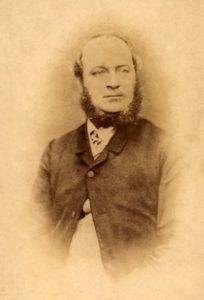It is my good fortune to have some documented records for several of my ancestors which have provided me with information about their Christmas-time experiences. Amongst one of the more interesting accounts is that of my great-great-grandfather George Clarke in 1864 when he spent Christmas in Germany accumulating evidence in a murder case.
Detective-Sergeant George Clarke, Christmas 1864

George Clarke had spent much of November 1864 investigating the murder of Theodor Fuhrhop, a recent German immigrant, whose decapitated body had been found on the Plaistow Marshes, London. The prime suspect, another German, Ferdinand Kohl, had been quickly arrested but the case against him needed to be strengthened by confirmation that some clothes and other items that Kohl had pawned had originally belonged to the murder victim. As Fuhrhop had arrived in Britain only a few weeks before his murder, the people best able to provide confirmation or otherwise of this were his family back in Germany. Clarke picks up the story....:
"I beg to report in reference the murder of Theodor Christian Fuhrhop at Plaistow, K Division...... that after receiving instructions from Mr Greenwood, Solicitor to the Treasury, I left London on the 21st ultimo [December] for Hamburg taking with me the whole of the property belonging to the murdered man, and which was in possession of Police. I arrived at Hamburg on the 23rd and delivered the letter of introduction to Mr. Ward, Her Majesty’s Consul in that town, who granted me every assistance. I shewed [sic] the property to the family of the deceased and it was all identified by Carl Henry Theodor Fuhrhop, the youngest brother, who I brought with me to London. On the 25th I left Hamburg for Splietau in Hanover, accompanied by an interpreter for the purpose of ascertaining the antecedents of the prisoner “Köhl” which I found to be generally bad. He enlisted in the Kings Regiment of Hussars in 1860 for ten years but after serving 2½ years he was convicted and sentenced to three months in a Military Prison for stealing from his comrades, and was then dismissed the service. In the early part of 1864 he was charged with stealing a quantity of harness at Ledorf near Splietau, but he then absconded to avoid punishment and came to England. I returned to Hamburg on the 27th and after making every possible enquiry I left for London where I arrived on the 31st. I have since furnished Mr Hodgson of the Treasury with all the information I had obtained and that gentleman has also taken a verbal statement from Carl Henry T. Fuhrhop. Mr Hodgson expressed himself pleased with the result of my enquiries”. [Crown Copyright extract from National Archives file TNA/PRO MEPO 3/77].
These days, a journey of that nature might be straightforward. In the middle of winter in 1864 it was undoubtedly less so....and somewhat lacking in Christmas cheer! However, Clarke's trip to Germany proved worthwhile. The information that he gained then, and during his earlier investigations in London, was central to the case against Kohl who was convicted for the murder of Fuhrhop and sentenced to death, a sentence that was carried out in public on 26 January 1865 outside Springfield Prison, Chelmsford. This was the last public execution to take place at the Prison. For further information about Clarke's investigation, see pages 51-65 of 'The Chieftain'.
